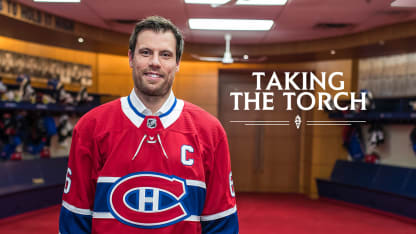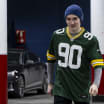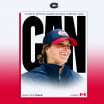Shea Weber is ready to learn from the past to help lead the Canadiens into the future.
On October 1, 2018, Shea Weber added his name to an exclusive list that includes Hall of Famers, Habs legends, and Stanley Cup Champions. He became only the 30th man to officially wear the "C" in Canadiens franchise history.
When you're in such elite company, it can be hard to find someone who knows exactly how to relate. Luckily for Weber, bouncing ideas off a former Habs captain was already part of his daily routine.
"If you look back at it, every captain of the Canadiens has gone about it differently," explained current Canadiens associate coach Kirk Muller, who captained the Habs in 1994-95 after winning the Stanley Cup as an assistant captain in 1993. "There's not one way to be the captain of the Montreal Canadiens.
"You look at Jean Beliveau and how graceful he was, to a guy like Bob Gainey, who was a quiet leader who just went about his business," continued Muller. "You have someone like Yvan Cournoyer who played with so much energy and excitement, and then there's a guy like Carbo [Guy Carbonneau], who was more of a two-way type of player. At the end of the day, everyone's different, but to be the captain, the biggest thing is leading by example. You try to lead on and off the ice and you do that by playing and preparing the right way."
Muller's tenure as Habs captain was brief, but after serving as captain of the Devils for four years before arriving in Montreal, he had plenty of NHL leadership experience to call on to help him slip seamlessly into his new role.
"At first, you think you're going to solve everything - your own game, everyone else's game - you think you're going to be Superman. Eventually I realized what I really had to do was play the game the right way and lead by example," explained Muller, who was 21 years old when he was named captain of the Devils. "You have to be team-first all the time. You have to be the rock. "That's something Webby is good at," he added. "He can be a calming presence who can get guys to take a breath and look at things without the emotion."
Weber may not be the most emotive player in the Habs dressing room, but even he was beaming after pulling on his newly-stitched jersey for the first time.
"This is such an incredible honor. Look at the guys I'm following and there are some special names there," shared Weber. "There's so much history in this organization that it's hard to put into words how it feels to be part of it. It's a meaningful, special feeling."
Every captain in Canadiens history has led in his own unique way, but that feeling Weber referenced is a familiar one to anyone who's been lucky enough to don the "C" in Montreal over the last century.
"I think the common denominator between all the guys who have been the captain in Montreal is how proud they are because of the guys who came before them," stressed Muller. "You want to honor those players and continue that tradition. The one thing we all have in common is that we all had a passion for playing the game and we all took so much pride in playing for the Montreal Canadiens."
Yvan Cournoyer, who held the job a decade-and-a-half before Muller, hoisted the Stanley Cup in each of his four seasons as captain of the Canadiens. He not only knows what it takes to lead, he knows what it takes to win - and it's something he's already seen from the 30th captain in franchise history.
"Being the captain is about more than what people see on the ice," confirmed Cournoyer, who won 10 Stanley Cups during his 16-year NHL career, including one Conn Smythe Trophy nod as playoff MVP in 1973. "You have to set the example all the time. I've had the chance to talk to Shea and you can tell he's someone who, when he speaks, guys will listen. The way he speaks and the way he carries himself, he has what it takes.
"I think there's more meaning to it, being the captain of the Montreal Canadiens. There's a lot of pressure on a captain in Montreal to help the team win," he added. "The thing is, a captain isn't leading by himself. You have to have a great group of leaders. You need everyone pulling in the same direction. If you don't have that, you're not going to win."
The legendary Hall-of-Famer learned the leadership ropes early on in his NHL career, apprenticing under one of the greatest captains to ever suit up for the Habs.
"Jean Beliveau was my first captain in Montreal. I learned more from him than anyone else because we roomed together on the road and I sat beside him in the dressing room so we had the chance to talk a lot," explained Cournoyer. "You learned just by watching the way he carried himself on and off the ice.
"The first thing Jean said to us was, 'If you have any problems, let's talk about it right away. Don't wait. I'm here to help you,'" shared Cournoyer of his first NHL captain. "You need to build that trust and that bond. Sometimes the most important thing the captain can do is get the team together off the ice. It's a long season - you spend more time with your teammates than you do with your wife or your family when you're playing, so it's really important that guys enjoy being together."
That's something that comes naturally to Weber, who, despite being sidelined with a knee injury to start the season, has been a unifying force by inviting rookies over for home-cooked meals and helping organize team outings.
"I don't actually think it about it consciously, it's just something we do," said Weber, who previously served as captain of the Nashville Predators from 2010 to 2016. "Maybe it's because that's how older guys were to me early on in my career, I'm not sure. It's a team sport and you want to make everyone feel as big a part of the team as possible."
Affectionally referred to as "Dad" around the Canadiens dressing room, the 2016 Mark Messier Leadership Award winner credits a slew of former teammates - from his Junior captains in Kelowna and the leaders he learned from in Nashville to the Team Canada All-Stars he played alongside on the international stage - for helping shape his own leadership style.
"I was young when I was named captain in Nashville. It was a learning experience as I went, and it was kind of on the fly," admitted Weber, who was named the fifth captain in Predators history just a few months before his 25th birthday. "As much as you think you're prepared for something like that, you learn a lot as you go. I was lucky because I was surrounded by a good team and a corps of guys who were a great support system for me and they helped me a lot early on in that process. I had a lot of great leaders in Nashville and I've played under great captains. You have to be yourself, but you can take little tidbits from everyone."
Weber may be older and wiser now than he was when he first donned the "C" at the NHL level, but his approach to rallying the troops has remained the same.
"The biggest thing is you want to get everyone involved as much as you can," he divulged. "Everyone on the team is just as important as the next guy. It doesn't matter if you play two minutes or 20 minutes; you have a role and you're a reason we're going to be successful. That's the expectation of everyone in here."
Far from a one-man show, Weber welcomes - and demands - leadership from everyone throughout the lineup. From alternate captains Brendan Gallagher and Paul Byron to a teenaged rookie like Jesperi Kotkaniemi, every player in the room has a role to play in Weber's leadership corps.
"There are so many guys in this locker room who are leaders and who could be wearing letters on their jersey," underlined Weber. "Being a leader isn't about a letter; it's about what you do on a daily basis to help the team win."
The six-time NHL All-Star and two-time Olympic gold medalist has always preferred to let his play do his talking for him. He's calm under pressure even on hockey's biggest stage, but when the cameras are rolling, he's more likely to be the strong, silent type than a spotlight seeker.
"I've heard a lot of talk about how Shea will be a quiet leader, but I see him as a Bob Gainey-type," said Muller. "It's not the amount of words you use that matters, it's about how much weight those words carry. Webby's words mean something.
"They mean something because he goes out and plays the game the right way. He's hard, he's physical, and he's respected not just by the guys in our organization, but also throughout the League," concluded Muller. "This is a guy who could be the captain of Team Canada. He brings that presence whether he's on the ice or in the dressing room or in the city. He carries that aura. He's built to be a captain."



















